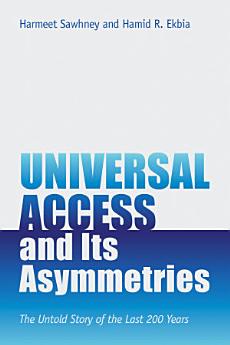Universal Access and Its Asymmetries: The Untold Story of the Last 200 Years
Dec 2022 · MIT Press
Ebook
244
Pages
family_home
Eligible
info
reportRatings and reviews aren’t verified Learn More
About this ebook
A framework for understanding the totality of costs and benefits of universal access that will foster honest appraisal and guide the development of good policies.
Universal access—the idea that certain technologies and services should be extended to all regardless of geography or ability to pay—evokes ideals of democracy and equality that must be reconciled with the realities on the ground. The COVID-19 pandemic raised awareness of the need for access to high-speed internet service in the United States, but this is just the latest in a long history of debates about what should be made available and to whom. Rural mail delivery, electrification, telephone service, public schooling, and library access each raised the same questions as today’s debates about health care and broadband. What types of services should be universally available? Who benefits from extending these services? And who bears the cost?
Stepping beyond humanitarian arguments to conduct a clear-eyed, diagnostic analysis, this book offers some surprising conclusions. While the conventional approach to universal access looks primarily at the costs to the system and the benefits to individuals, Harmeet Sawhney and Hamid Ekbia provide a holistic perspective that also accounts for costs to individuals and benefits for systems. With a comparative approach across multiple cases, Universal Access and Its Asymmetries is an essential exploration of the history, costs, and benefits of providing universal access to technologies and services. With a fresh perspective, it overturns common assumptions and offers a foundation for making decisions about how to extend service—and how to pay for it.
Universal access—the idea that certain technologies and services should be extended to all regardless of geography or ability to pay—evokes ideals of democracy and equality that must be reconciled with the realities on the ground. The COVID-19 pandemic raised awareness of the need for access to high-speed internet service in the United States, but this is just the latest in a long history of debates about what should be made available and to whom. Rural mail delivery, electrification, telephone service, public schooling, and library access each raised the same questions as today’s debates about health care and broadband. What types of services should be universally available? Who benefits from extending these services? And who bears the cost?
Stepping beyond humanitarian arguments to conduct a clear-eyed, diagnostic analysis, this book offers some surprising conclusions. While the conventional approach to universal access looks primarily at the costs to the system and the benefits to individuals, Harmeet Sawhney and Hamid Ekbia provide a holistic perspective that also accounts for costs to individuals and benefits for systems. With a comparative approach across multiple cases, Universal Access and Its Asymmetries is an essential exploration of the history, costs, and benefits of providing universal access to technologies and services. With a fresh perspective, it overturns common assumptions and offers a foundation for making decisions about how to extend service—and how to pay for it.
About the author
Harmeet Sawhney is Professor, The Media School, Indiana University, Bloomington. He is Editor-in-Chief of The Information Society. Hamid Ekbia is Professor, School of Informatics, Computing, and Engineering, Indiana University, Bloomington. He is the author of Heteromation and Other Stories of Computing and Capitalism (MIT Press) and Artificial Dreams: The Quest for Non-Biological Intelligence (Cambridge University Press).
Rate this ebook
Tell us what you think.
Reading information
Smartphones and tablets
Install the Google Play Books app for Android and iPad/iPhone. It syncs automatically with your account and allows you to read online or offline wherever you are.
Laptops and computers
You can listen to audiobooks purchased on Google Play using your computer's web browser.
eReaders and other devices
To read on e-ink devices like Kobo eReaders, you'll need to download a file and transfer it to your device. Follow the detailed Help Center instructions to transfer the files to supported eReaders.






